L76-复合句之状语从句 初中英语词性句法新讲课件
文档属性
| 名称 | L76-复合句之状语从句 初中英语词性句法新讲课件 |
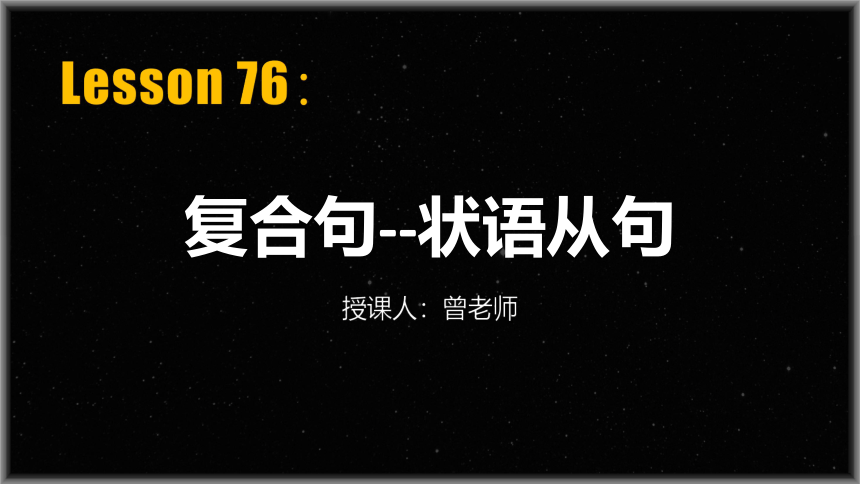
|
|
| 格式 | ppt | ||
| 文件大小 | 1.1MB | ||
| 资源类型 | 试卷 | ||
| 版本资源 | 通用版 | ||
| 科目 | 英语 | ||
| 更新时间 | 2022-04-11 09:59:44 | ||
图片预览

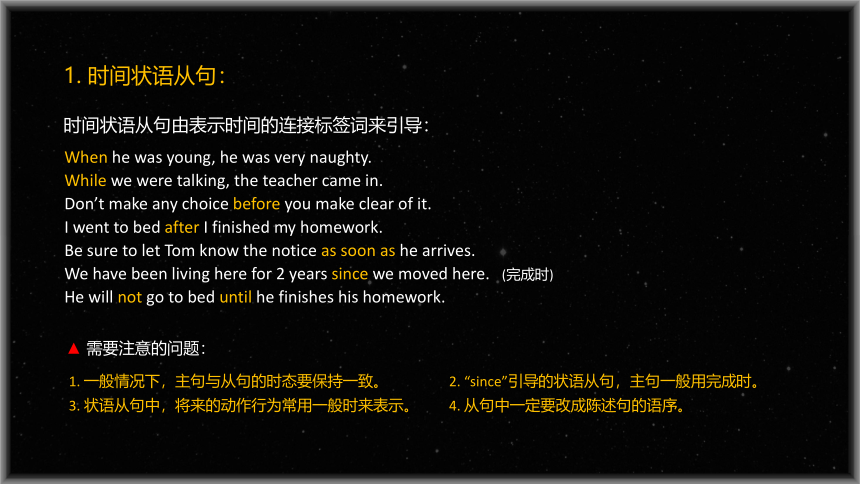
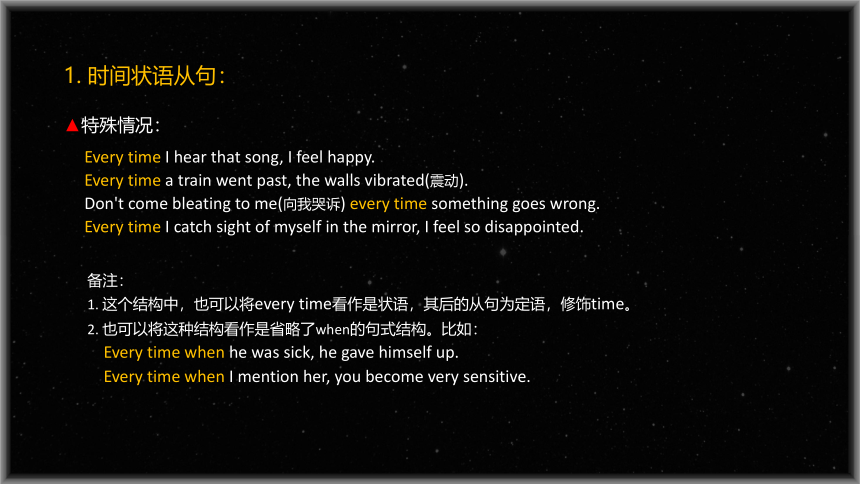
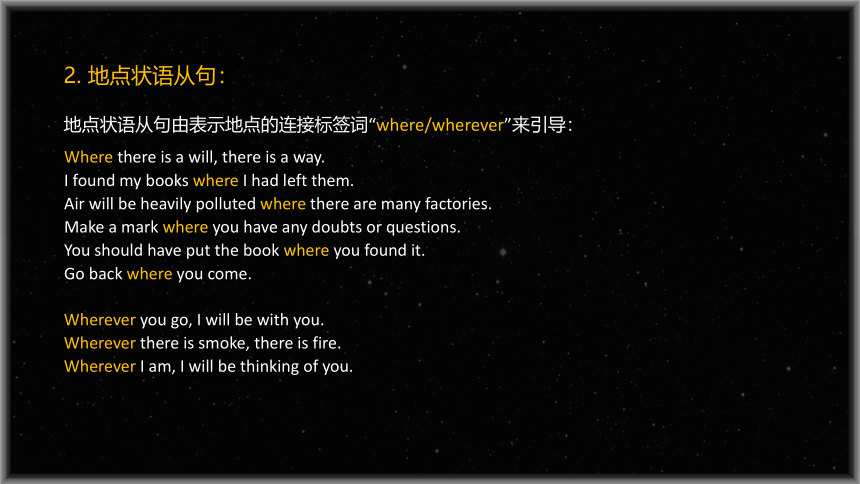
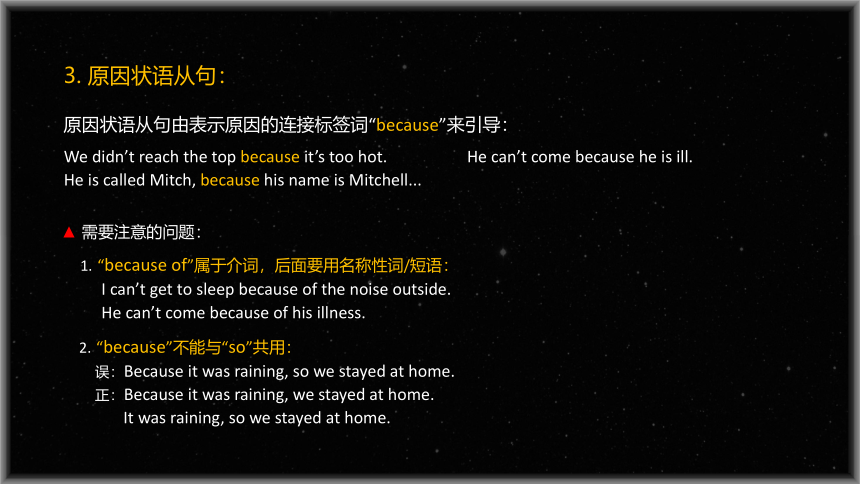
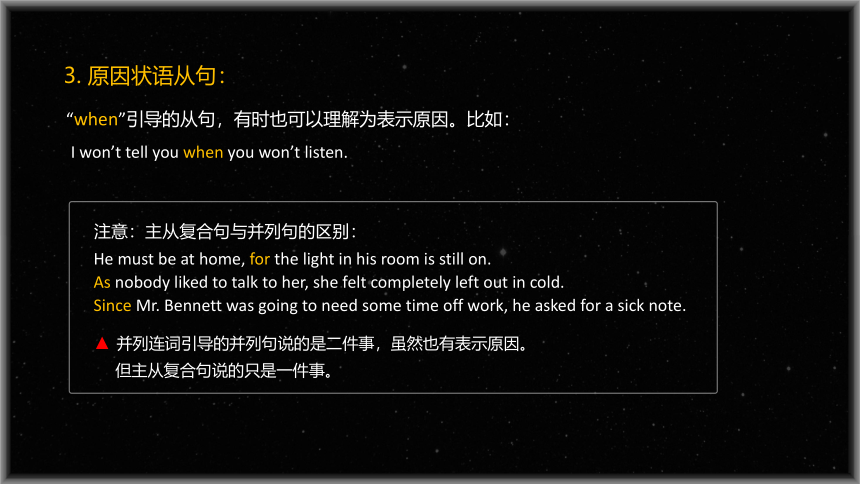
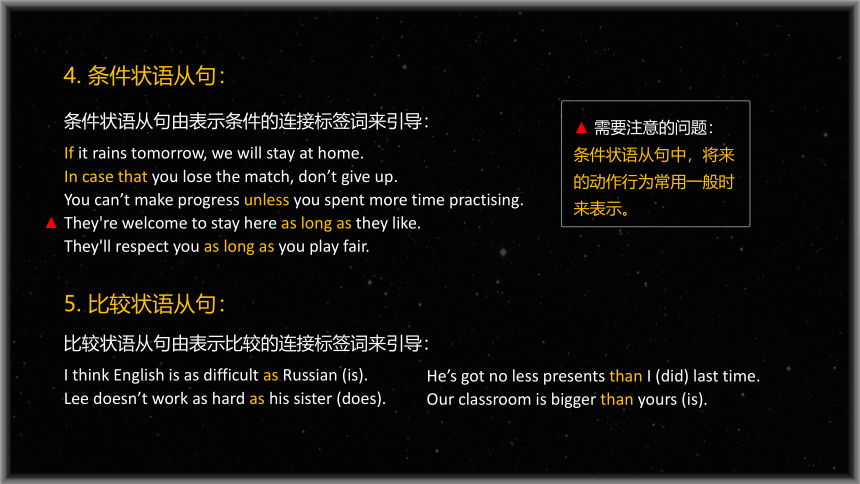
文档简介
(共18张PPT)
复合句--状语从句
Lesson 76:
授课人:曾老师
1. 时间状语从句:
时间状语从句由表示时间的连接标签词来引导:
When he was young, he was very naughty.
While we were talking, the teacher came in.
Don’t make any choice before you make clear of it.
I went to bed after I finished my homework.
Be sure to let Tom know the notice as soon as he arrives.
We have been living here for 2 years since we moved here. (完成时)
He will not go to bed until he finishes his homework.
▲ 需要注意的问题:
2. “since”引导的状语从句,主句一般用完成时。
4. 从句中一定要改成陈述句的语序。
1. 一般情况下,主句与从句的时态要保持一致。
3. 状语从句中,将来的动作行为常用一般时来表示。
1. 时间状语从句:
▲特殊情况:
Every time I hear that song, I feel happy.
Every time a train went past, the walls vibrated(震动).
Don't come bleating to me(向我哭诉) every time something goes wrong.
Every time I catch sight of myself in the mirror, I feel so disappointed.
备注:
1. 这个结构中,也可以将every time看作是状语,其后的从句为定语,修饰time。
2. 也可以将这种结构看作是省略了when的句式结构。比如:
Every time when he was sick, he gave himself up.
Every time when I mention her, you become very sensitive.
2. 地点状语从句:
地点状语从句由表示地点的连接标签词“where/wherever”来引导:
Where there is a will, there is a way.
I found my books where I had left them.
Air will be heavily polluted where there are many factories.
Make a mark where you have any doubts or questions.
You should have put the book where you found it.
Go back where you come.
Wherever you go, I will be with you.
Wherever there is smoke, there is fire.
Wherever I am, I will be thinking of you.
3. 原因状语从句:
▲ 需要注意的问题:
1. “because of”属于介词,后面要用名称性词/短语:
I can’t get to sleep because of the noise outside.
He can’t come because of his illness.
原因状语从句由表示原因的连接标签词“because”来引导:
We didn’t reach the top because it’s too hot.
He is called Mitch, because his name is Mitchell...
He can’t come because he is ill.
2. “because”不能与“so”共用:
误:Because it was raining, so we stayed at home.
正:Because it was raining, we stayed at home.
It was raining, so we stayed at home.
3. 原因状语从句:
I won’t tell you when you won’t listen.
“when”引导的从句,有时也可以理解为表示原因。比如:
注意:主从复合句与并列句的区别:
He must be at home, for the light in his room is still on.
As nobody liked to talk to her, she felt completely left out in cold.
Since Mr. Bennett was going to need some time off work, he asked for a sick note.
▲ 并列连词引导的并列句说的是二件事,虽然也有表示原因。
但主从复合句说的只是一件事。
4. 条件状语从句:
条件状语从句由表示条件的连接标签词来引导:
If it rains tomorrow, we will stay at home.
In case that you lose the match, don’t give up.
You can’t make progress unless you spent more time practising.
They're welcome to stay here as long as they like.
They'll respect you as long as you play fair.
▲ 需要注意的问题:
条件状语从句中,将来
的动作行为常用一般时
来表示。
5. 比较状语从句:
比较状语从句由表示比较的连接标签词来引导:
I think English is as difficult as Russian (is).
Lee doesn’t work as hard as his sister (does).
He’s got no less presents than I (did) last time.
Our classroom is bigger than yours (is).
▲
6. 目的状语从句:
目的状语从句由表示目的的连接标签词来引导:
He worked hard so that he might finish his work in time.
They worked hard in order that they might succeed.
7. 结果状语从句:
结果状语从句由表示结果的连接标签词来引导:
The question is so difficult that nobody can answer it.
This is such a difficult task that nobody can work it out.
8. 让步状语从句:
“although/though”引导的让步状语从句:
Although/Though Switzerland is very small, it is very rich.
Although/Though he was exhausted, he(still) kept on working.
Although/Though he is very old, (yet) he is quite strong.
Though I believe it, yet I must consider.
She passed the examination though she had not studied very hard.
▲ 需要注意的问题:
“although”引导的让步状语从句位于主句之前的情况较多,“though”引导的让步状语从句既可
位于主句之前,也可位于主句之后。
9. 非让步状语从句:
“Whether”引导的非让步状语从句:
You’ll have to attend the ceremony(庆典) whether you’re free or busy.
Whether you believe it or not, it’s true.
Whether or not they win this battle, they won’t win the war.
▲ 需要注意:从句中一定要用陈述句的语序。
10. 伴随方式状语(补充说明状语从句):
英文中也常用独立短语作伴随状语,来进行补充说明。比如:
The master entered the room, followed by his dog.
The dog entered the room, following his master.
He sent me an e-mail hoping to get further information.
He soon falls asleep with the candle still burning.
He was lying on the grass, with his hands crossed under his head.
She sat there alone while her eyes being filled with tears.
The little girls were playing with snow, their hands frozen red.
从句连词“while”与“when”的区别:
when:
1. at or during the time that 在某个时间点上(当...时候),或在某段时期内
I loved history when I was at school. 我上学时喜欢历史。
She did a lot of acting when she was at college.
It was raining when we arrived.
When she was 50, she was running marathons.
I was sleeping when he called. 他打我电话时,我正在睡觉。中文反过来说:我正在睡觉时,他打电话给我
He had just drifted off to sleep when the phone rang. (同上)
How can they expect to learn anything when they never listen 中文会表述为:既然...
Why do you want a new job when you already have such a good one (同上)
She claimed to be 18, when I know she’s only 16. 中文会表述为:尽管/既然...
此时不等同于while
从句连词“while”与“when”的区别:
when:
3. after 与基本义同,但言中含有“紧随在…之后”之义,即主句动作紧挨着从句动作发生
Call me when you’ve finished it. 你完成这件事后就打电话给我。
In the warm weather, when I get home from work, I drink a cold glass of white wine.
When he had finished his work, he began to take a rest.
2. at any time that; whenever 与基本义同,但言中含有“任意时间”之义
Can you spare five minutes when it’s convenient 方便时能占用你五分钟时间吗?
I won’t tell you when you won’t listen. 当(只要)你不想听,我就不会告诉你。
此时不等同于while
此时不等同于while
从句连词“while”与“when”的区别:
while:
1. during the time that sth. is happening 强调在某种状态下
We must have been burgled while we were asleep. 我们睡着时一定让贼入室偷了。
The master entered the room, while he was followed by his dog.
“Can’t you read it ” Mary said angrily while she was pointing to the notice.
He soon falls asleep while the candle is still burning.
While I was waiting at the bus stop, three buses went by in the opposite direction.
这种情况下可以同时使用when。但:
while偏向于表示“在那种状态下”
when则偏向于表示“在那段时间内”
从句连词“while”与“when”的区别:
while:
2. at the same time as sth. else happens or is happening 与此同时,强调在从句这种状态下
She sat there alone while her eyes were filled with tears.
The teacher was singing while the students were dancing.
Yesterday for hours, my friend was packing boxes, while I was taping and labeling them.
The little girls were playing with snow, while their hands were frozen red.
He sent me an e-mail while he hoped to get further information. (=while hoping)
此时不同于“when” ,且从句必须是一个可延续的动作或一种状态下。
从句连词“while”与“when”的区别:
while:
3. used to contrast two things 对比二件事情,相当于“与此同时”
You like English while I like Chinese.
He is quite strong while his brother is weak.
While Tom’s very good at science, his brother is absolutely hopeless.
4. although; despite the fact that… 用于句首,相当于“虽然/尽管”
While I am willing to help, I do not have much time available. 尽管我愿意帮忙,但是没有多少时间。
此时不能用“when”
此时不能用“when”
从句连词“while”与“when”的区别:
试对比:
She claimed to be 18, when I knew she’s only 16.
She claimed to be 18, while I know she’s only 16.
Can you spare five minutes when you are convenient
Can you spare five minutes while you are convenient
当我知道...的时候
可是(与此同时),我却知道...
当你空的时候
在你空的状态下
You can go swimming when I’m having lunch.
You can go swimming while I’m having lunch.
当我吃饭的时候
在我在吃饭的状态下
I won’t tell you when you won’t listen.
I won’t speak any more while you are not listening.
当你不想听的时候
在你不在听的状态下
从句连词“while”与“when”的区别:
Her parents died when she was still at school.
Her parents died while she was still at school.
当她还在读书的时候
当她还处于读书的状态下..
She got into an accident when she was driving home.
She got into an accident while she was driving home.
When I was washing the dishes, my wife came home. (=When I washing)
While I was washing the dishes, my wife came home. (=While I washing)
复合句--状语从句
Lesson 76:
授课人:曾老师
1. 时间状语从句:
时间状语从句由表示时间的连接标签词来引导:
When he was young, he was very naughty.
While we were talking, the teacher came in.
Don’t make any choice before you make clear of it.
I went to bed after I finished my homework.
Be sure to let Tom know the notice as soon as he arrives.
We have been living here for 2 years since we moved here. (完成时)
He will not go to bed until he finishes his homework.
▲ 需要注意的问题:
2. “since”引导的状语从句,主句一般用完成时。
4. 从句中一定要改成陈述句的语序。
1. 一般情况下,主句与从句的时态要保持一致。
3. 状语从句中,将来的动作行为常用一般时来表示。
1. 时间状语从句:
▲特殊情况:
Every time I hear that song, I feel happy.
Every time a train went past, the walls vibrated(震动).
Don't come bleating to me(向我哭诉) every time something goes wrong.
Every time I catch sight of myself in the mirror, I feel so disappointed.
备注:
1. 这个结构中,也可以将every time看作是状语,其后的从句为定语,修饰time。
2. 也可以将这种结构看作是省略了when的句式结构。比如:
Every time when he was sick, he gave himself up.
Every time when I mention her, you become very sensitive.
2. 地点状语从句:
地点状语从句由表示地点的连接标签词“where/wherever”来引导:
Where there is a will, there is a way.
I found my books where I had left them.
Air will be heavily polluted where there are many factories.
Make a mark where you have any doubts or questions.
You should have put the book where you found it.
Go back where you come.
Wherever you go, I will be with you.
Wherever there is smoke, there is fire.
Wherever I am, I will be thinking of you.
3. 原因状语从句:
▲ 需要注意的问题:
1. “because of”属于介词,后面要用名称性词/短语:
I can’t get to sleep because of the noise outside.
He can’t come because of his illness.
原因状语从句由表示原因的连接标签词“because”来引导:
We didn’t reach the top because it’s too hot.
He is called Mitch, because his name is Mitchell...
He can’t come because he is ill.
2. “because”不能与“so”共用:
误:Because it was raining, so we stayed at home.
正:Because it was raining, we stayed at home.
It was raining, so we stayed at home.
3. 原因状语从句:
I won’t tell you when you won’t listen.
“when”引导的从句,有时也可以理解为表示原因。比如:
注意:主从复合句与并列句的区别:
He must be at home, for the light in his room is still on.
As nobody liked to talk to her, she felt completely left out in cold.
Since Mr. Bennett was going to need some time off work, he asked for a sick note.
▲ 并列连词引导的并列句说的是二件事,虽然也有表示原因。
但主从复合句说的只是一件事。
4. 条件状语从句:
条件状语从句由表示条件的连接标签词来引导:
If it rains tomorrow, we will stay at home.
In case that you lose the match, don’t give up.
You can’t make progress unless you spent more time practising.
They're welcome to stay here as long as they like.
They'll respect you as long as you play fair.
▲ 需要注意的问题:
条件状语从句中,将来
的动作行为常用一般时
来表示。
5. 比较状语从句:
比较状语从句由表示比较的连接标签词来引导:
I think English is as difficult as Russian (is).
Lee doesn’t work as hard as his sister (does).
He’s got no less presents than I (did) last time.
Our classroom is bigger than yours (is).
▲
6. 目的状语从句:
目的状语从句由表示目的的连接标签词来引导:
He worked hard so that he might finish his work in time.
They worked hard in order that they might succeed.
7. 结果状语从句:
结果状语从句由表示结果的连接标签词来引导:
The question is so difficult that nobody can answer it.
This is such a difficult task that nobody can work it out.
8. 让步状语从句:
“although/though”引导的让步状语从句:
Although/Though Switzerland is very small, it is very rich.
Although/Though he was exhausted, he(still) kept on working.
Although/Though he is very old, (yet) he is quite strong.
Though I believe it, yet I must consider.
She passed the examination though she had not studied very hard.
▲ 需要注意的问题:
“although”引导的让步状语从句位于主句之前的情况较多,“though”引导的让步状语从句既可
位于主句之前,也可位于主句之后。
9. 非让步状语从句:
“Whether”引导的非让步状语从句:
You’ll have to attend the ceremony(庆典) whether you’re free or busy.
Whether you believe it or not, it’s true.
Whether or not they win this battle, they won’t win the war.
▲ 需要注意:从句中一定要用陈述句的语序。
10. 伴随方式状语(补充说明状语从句):
英文中也常用独立短语作伴随状语,来进行补充说明。比如:
The master entered the room, followed by his dog.
The dog entered the room, following his master.
He sent me an e-mail hoping to get further information.
He soon falls asleep with the candle still burning.
He was lying on the grass, with his hands crossed under his head.
She sat there alone while her eyes being filled with tears.
The little girls were playing with snow, their hands frozen red.
从句连词“while”与“when”的区别:
when:
1. at or during the time that 在某个时间点上(当...时候),或在某段时期内
I loved history when I was at school. 我上学时喜欢历史。
She did a lot of acting when she was at college.
It was raining when we arrived.
When she was 50, she was running marathons.
I was sleeping when he called. 他打我电话时,我正在睡觉。中文反过来说:我正在睡觉时,他打电话给我
He had just drifted off to sleep when the phone rang. (同上)
How can they expect to learn anything when they never listen 中文会表述为:既然...
Why do you want a new job when you already have such a good one (同上)
She claimed to be 18, when I know she’s only 16. 中文会表述为:尽管/既然...
此时不等同于while
从句连词“while”与“when”的区别:
when:
3. after 与基本义同,但言中含有“紧随在…之后”之义,即主句动作紧挨着从句动作发生
Call me when you’ve finished it. 你完成这件事后就打电话给我。
In the warm weather, when I get home from work, I drink a cold glass of white wine.
When he had finished his work, he began to take a rest.
2. at any time that; whenever 与基本义同,但言中含有“任意时间”之义
Can you spare five minutes when it’s convenient 方便时能占用你五分钟时间吗?
I won’t tell you when you won’t listen. 当(只要)你不想听,我就不会告诉你。
此时不等同于while
此时不等同于while
从句连词“while”与“when”的区别:
while:
1. during the time that sth. is happening 强调在某种状态下
We must have been burgled while we were asleep. 我们睡着时一定让贼入室偷了。
The master entered the room, while he was followed by his dog.
“Can’t you read it ” Mary said angrily while she was pointing to the notice.
He soon falls asleep while the candle is still burning.
While I was waiting at the bus stop, three buses went by in the opposite direction.
这种情况下可以同时使用when。但:
while偏向于表示“在那种状态下”
when则偏向于表示“在那段时间内”
从句连词“while”与“when”的区别:
while:
2. at the same time as sth. else happens or is happening 与此同时,强调在从句这种状态下
She sat there alone while her eyes were filled with tears.
The teacher was singing while the students were dancing.
Yesterday for hours, my friend was packing boxes, while I was taping and labeling them.
The little girls were playing with snow, while their hands were frozen red.
He sent me an e-mail while he hoped to get further information. (=while hoping)
此时不同于“when” ,且从句必须是一个可延续的动作或一种状态下。
从句连词“while”与“when”的区别:
while:
3. used to contrast two things 对比二件事情,相当于“与此同时”
You like English while I like Chinese.
He is quite strong while his brother is weak.
While Tom’s very good at science, his brother is absolutely hopeless.
4. although; despite the fact that… 用于句首,相当于“虽然/尽管”
While I am willing to help, I do not have much time available. 尽管我愿意帮忙,但是没有多少时间。
此时不能用“when”
此时不能用“when”
从句连词“while”与“when”的区别:
试对比:
She claimed to be 18, when I knew she’s only 16.
She claimed to be 18, while I know she’s only 16.
Can you spare five minutes when you are convenient
Can you spare five minutes while you are convenient
当我知道...的时候
可是(与此同时),我却知道...
当你空的时候
在你空的状态下
You can go swimming when I’m having lunch.
You can go swimming while I’m having lunch.
当我吃饭的时候
在我在吃饭的状态下
I won’t tell you when you won’t listen.
I won’t speak any more while you are not listening.
当你不想听的时候
在你不在听的状态下
从句连词“while”与“when”的区别:
Her parents died when she was still at school.
Her parents died while she was still at school.
当她还在读书的时候
当她还处于读书的状态下..
She got into an accident when she was driving home.
She got into an accident while she was driving home.
When I was washing the dishes, my wife came home. (=When I washing)
While I was washing the dishes, my wife came home. (=While I washing)
同课章节目录
- 词法
- 名词
- 动词和动词短语
- 动词语态
- 动词时态
- 助动词和情态动词
- 非谓语动词
- 冠词
- 代词
- 数词和量词
- 形容词副词及其比较等级
- 介词和介词短语
- 连词和感叹词
- 构词法
- 相似、相近词比较
- 句法
- 陈述句
- 一般疑问句和否定疑问句
- 特殊疑问句及选择疑问句
- 反意疑问句
- 存在句(There be句型)
- 宾语从句
- 定语从句
- 状语从句
- 主谓一致问题
- 简单句
- 并列句
- 复合句
- 主谓一致
- 主、表语从句
- 名词性从句
- 直接引语和间接引语
- 虚拟语气
- 感叹句
- 强调句
- 倒装句
- 祈使句
- 句子的成分
- 句子的分类
- 题型专区
- 单项选择部分
- 易错题
- 完形填空
- 阅读理解
- 词汇练习
- 听说训练
- 句型转换
- 补全对话
- 短文改错
- 翻译
- 书面表达
- 任务型阅读
- 语法填空
- 其他资料
